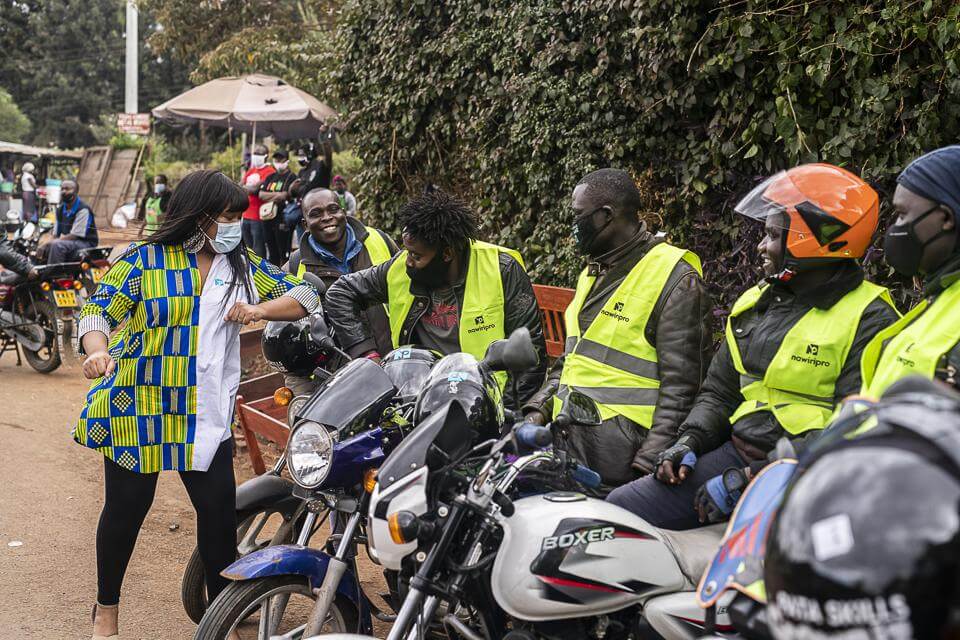
Bill Gates Is Supporting A Nonprofit To Train Motorbike Taxi Drivers In Kenya
Dan Mayeko, a native of Kenya, says he used to make about $5 a day working in the capital city, Nairobi. But after undergoing training provided by Educate!, a nonprofit group – including going to driving school and learning how to use Google Maps – he says his daily pay as a motorbike taxi driver and courier has grown to more than $30.
Transformations like Mayeko’s are the goal of Educate!, which has been working to provide skills training to youth in East Africa for more than a decade. “Motorcycle drivers are the lifeblood of e-commerce in Kenya,” says Boris Bulayev, cofounder and CEO of Educate! But drivers – many of whom have not attended high school — need help with basic skills, like reading maps and learning how to use apps like Uber, he explains.
Educate!’s Millicent “Missy” Kachigiri, working with her colleagues, cofounded NawiriPro, a mobile learning initiative to teach business skills. After a pilot program last year, participants in the NawiriPro bootcamp for motorcycle couriers more than doubled their income. Educate! has also worked to provide motorbike couriers loans to buy smartphones, which are necessary for the job.
“We’ve seen in a short 3-week in-person bootcamp that youth can more than double their income after just a few months,” says Bulayev. “We’re now translating that into an online eLearning platform, and are generating lots of inbound youth interest.’
This initial success led The Bill & Melinda Gates Foundation to recently select Educate! and its NawiriPro platform as one of two “accelerators” for 2020— a boost of support that is (surprisingly) not accompanied by any grant money from the foundation. The selection is part of Goalkeepers, a Gates Foundation program aimed at achieving the sustainable development goals agreed on by world leaders in 2015. Educate!’s bootcamp and app are working to meet one of the development goals: providing “decent work and economic growth.”
A key challenge in Africa is absorbing the large number of people entering the workforce on the continent now and in the decades ahead. There is a scarcity of jobs. In Kenya, an estimated 83% of people work in the informal sector, according to the World Bank, doing things like delivering goods by motorbike, selling items from roadside stalls, running food kiosks and more. Many of the country’s young people joining the informal sector lack a high school education or training in basic skills. And according to Educate!, there is a high rate of youth unemployment.
The goal set by the Gates Foundation for Educate! is to use its NawiriPro e-learning platform to train 100,000 youth motorbike couriers in Kenya by 2023, teaching them about things like business registration, legal requirements and the use of technology. By next year it aims to launch a training program for women and people in rural areas of the country, likely focusing on how to run a restaurant stall or retail kiosk. Another goal is to expand outside of Nairobi County to 6 additional counties in Kenya, and possibly to another country as well.
Bulayev’s team at Educate! is currently offering the motorbike courier training for free, and has received financial support from several charitable foundations, including the Pierre Omidyar and Pam Omdiyar-backed foundation Imaginable Futures, the Rippleworks Foundation (funded primarily by U.S. cryptocurrency billionaire Chris Larsen) and the foundation of Australia-based software firm Atlassian. Educate! also has support from Kenya’s Ministry of Health and Ministry of Trade. Bulayev’s goal is for the program to be financially sustainable, so his group is looking into different payment models, including subscriptions or charging for the in-person bootcamp.
Educate! has big plans. It is working to teach soft skills like public speaking, teamwork, creativity and self-confidence, as well as business skills like budgeting, saving and market research. And it wants to add access to financing and other services. Says Bulayev, “Long term, our goal is to serve 100,000 new [young people] annually with a financially sustainable model.”

